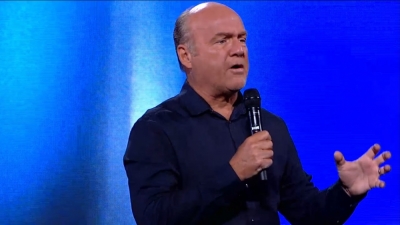How to Do Evangelism, Jesus Style
Adapted from Greg Laurie's book, Tell Someone (B & H Books, February 2016)

A person can argue all day with you about certain facts. But they can't argue with your personal story of how you came to faith.
The woman at the well had quite a story. She was what we would call "a woman with a reputation." Most likely, everyone in her village knew something about her personal life: she had been married and divorced five times, and with her latest partner, she hadn't even bothered getting married.
And then she met Jesus Christ, and put her faith in Him (John 4:1–42). After her conversation with Jesus she immediately went out and began to tell others. I'm sure that everyone she met knew her story — and could see with their own eyes that some sort of amazing, radical transformation had taken place in her life.
What could have happened? Who was this man Jesus who had so changed her life? The people in the village were completely intrigued. Her story — or testimony —was powerful, and "many of the Samaritans of that city believed in Him because of the word of the woman who testified, 'He told me all that I ever did'" (John 4:39, NKJV).
Using your testimony as a bridge is very effective because it helps to find that common ground with the person you're speaking with. They may be surprised that you weren't always the way that you are now as a Christian — that you didn't always believe what you now believe.
You could say something like "This is the way I used to think and the way I used to view Christians and the church, but then…." Fact is, the way you used to think may be the way the person you're speaking with thinks now. You are showing them how and why you changed your direction in life — how and why you became a follower of Jesus Christ. Perhaps you struggled with drugs or alcohol. Possibly you were in a life of crime. You may have been living in immorality. Then again, you may not have been addicted to anything, but had achieved some real success in your life. But there was still an emptiness — an aching hollow place in the core of your soul.
Just tell your story! Every testimony of an individual deciding to follow Christ is valid, because there is someone out there a lot like you.
Some might be moved and convinced after hearing of a former criminal who came to Christ, but not everyone would relate to that story. They might even dismiss it, thinking they don't need Christ because only "that kind of person" needs Him, but they don't. They need to understand that everyone needs Jesus because everyone has sinned!
Even if you were raised in the church and never went out and tasted all the things this world has to offer, that is still a testimony.
Let me tell you your own story right now without even knowing you. Ready?
• You were in rebellion against God because of your sin.
• You heard the gospel.
• You believed in Jesus and turned from your sin.
• He forgave you of all your sins and gave you a peace and purpose in life.
• Now, instead of going to Hell when you die, you are going to Heaven.
Every one of us can tell our story. You don't have to be a public speaker or an expert in theology to do so. It's worth noting that the apostle Paul often used his personal testimony when he spoke. Though he was a brilliant orator and knew the Scriptures backwards and forwards, he often started by telling his own story to build a bridge with his listeners. It's a good plan! Simply tell your story as it unfolded, then transition to the message of what the gospel is.
Accuracy and truthfulness in telling your story is really important. I have noticed that some people's testimonies get more dramatic with the passing of time! Perhaps they think that will make their story more appealing, but if it doesn't ring true, people won't be moved by it. Just tell the truth about your life and what God did for you.
Our story is the bridge…not the destination. The point of sharing your story is so you can tell His story: His love for humanity, His death on the cross, and His resurrection from the dead. Just give the big picture and sum it up as Paul did when standing before a Roman leader. He said that he had "turned from darkness to light" and from the power of Satan to God, and now he had an eternal inheritance. We don't want people marveling over our story, but over His — the sacrifice that Jesus made, the price that He paid because of His great love for us.
When the woman at the well told her story, she pointed to Jesus, and as a result, "many of the Samaritans of that city believed in Him" (John 4:39, NKJV). As you tell your story, I pray that something similar will happen.



























